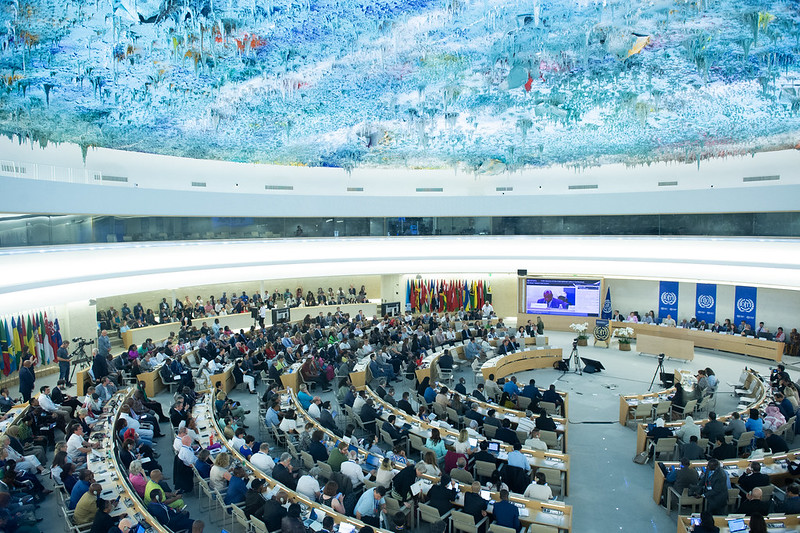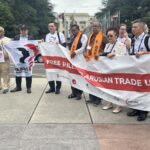17 June, 2025Over 5,400 delegates from governments, workers’ and employers’ organizations across 187 ILO member states met for the 113th Session of the International Labour Conference (ILC), on 2-13 June in Geneva. The meeting concluded with significant progress on global labour standards, including the adoption of a groundbreaking new convention on biological hazards in the workplace.
A key achievement of this year’s ILC was the adoption of the first-ever international labour standard, aimed at preventing exposure to biological hazards in the workplace. Convention 192, accompanied by a Recommendation, provides a comprehensive framework to protect workers from biological risks, present and emerging, across all types of work environments. This new standard is expected to play a critical role in enhancing occupational safety and health globally.
The ILC launched the first standard-setting discussion on decent work in the platform economy, a milestone in the fight for the rights of gig and digital workers. The future standards will take the form of a Convention supported by a Recommendation, to be finalized at the 114th ILC in 2026. Among other things, the proposed instruments will cover fundamental rights at work, fair remuneration and social protection, occupational safety and health, as well as data protection and privacy.
Addressing informality
A major outcome of the ILC was the adoption of a Resolution on transitioning from informal to formal employment, reaffirming the principles of Recommendation 204 and urging countries to implement national strategies for formalization.
The Workers’ Group played a vital role in shaping the resolution, insisting on stronger language around freedom of association, collective bargaining, and labour rights for the global workforce.
Key elements of the resolution include:
- Expanded recognition of vulnerable workers, like care workers, recycling workers and miners
- Emphasis on gender-responsive policies
- Acknowledgement of informal work driven by lack of legal compliance, organized crime, stigmatization and inadequate care infrastructure
- Call for robust enforcement of labour laws and universal social protection
- Support for due diligence and supply chain regulation to address informal employment within global business operations
Workers’ rights are human rights
In a politically significant decision, the ILC voted to grant Palestine non-member observer status, transitioning from its previous classification as a liberation movement. This entitles Palestine to participate in ILO meetings as a non-member observer state, aligning with its growing international recognition.
The ILC adopted a resolution on Myanmar, invoking Article 33 of the ILO Constitution against Myanmar’s military junta. Only used twice before in ILO's history, this demands that the military authorities fully implement the recommendations of the ILO Commission of Inquiry, particularly regarding freedom of association and the elimination of forced labour. The Resolution calls for enhanced international scrutiny and support to uphold the rights of Myanmar’s workers.
The Committee on the Application of Standards (CAS) examined 24 individual country cases. During the special sitting on Belarus, IndustriALL condemned the ongoing repression of democratic trade unionism, highlighting the dissolution of its affiliates and the imprisonment of union leaders on politically motivated charges. IndustriALL called for the immediate and unconditional release of imprisoned activists, including Henadz Fiadynich, Vatslau Areshka, and five female leaders such as Volha Brytsikava, many of whom face abuse, isolation, and declining health. International scrutiny must remain until meaningful progress is made by the Belarusian government.
In the session on Hungary, IndustriALL called out the Hungarian government for undermining trade union rights through vague laws, digital surveillance of workers and weakened social dialogue. IndustriALL condemned the abolition of payroll deduction for union dues, which has caused a sharp decline in union membership and finances, and called for urgent reforms to protect freedom of expression, simplify union registration, amend the Strike Act and restore sectoral collective bargaining.
IndustriALL also spoke on cases concerning Georgia, Iraq, Kyrgyzstan and Malaysia, where workers are facing increasing reduced spaces for organizing, along with weakening labour laws.
Says IndustriALL general secretary Atle Høie:
“This year’s International Labour Conference marks a turning point for workers and trade unions globally. The adoption of the Convention on biological hazards sets a new benchmark for workplace safety, while launching negotiations for decent work in the platform economy is a major win for precarious workers.
“Crucially, the application of Article 33 sanctions on Myanmar sends a powerful signal; the military junta’s continued, violent repression of unions and workers will have consequences in the international community. IndustriALL will continue to defend our affiliates and their fundamental labour rights.”
Cover photo: Violaine Martin / ILO



